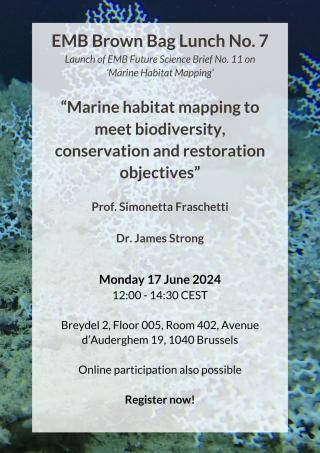
This was the launch event for the the European Marine Board's Future Science Brief No. 11 on 'Marine habitat mapping'. The event highlighted key scientific and policy recommendations for advancing marine habitat mapping including the latest technology to increase the quality and resolution of maps, how to better represent biology and the complexity of marine ecosystems, prioritisation of key habitats to map and costs involved. It also addressed how marine habitat mapping can best support key European and international commitments on marine biodiversity, conservation, restoration and management. The Future Science Brief was written by the EMB Working Group on Marine Habitat Mapping, consisting of 14 experts from 11 European countries. The Chairs of the Working Group, Prof. Simonetta Fraschetti (University of Naples Federico II & Stazione Zoologica Anton Dohrn (SZN), Italy) and Dr. James Strong (National Oceanography Centre (NOC), UK), presented the key messages from document, with a specific focus on links to the proposed Nature Restoration Law, the Marine Strategy Framework Directive and the Habitats and Birds Directives. The event ended with an interactive discussion between the audience, the Chairs of the Working Group and additional Working Group members.
Download the slides here.
Watch the opening remarks and presentation on the EMB YouTube channel.
Programme:
This Brown Bag Lunch is an in-person event, with the possibility to join remotely.
📍 Breydel 2, Floor 005, Room 402, Avenue d’Auderghem 19, 1040 Brussels
📅 Monday 17 June 2024, 12:00 - 14:30 CEST
🍴 12:00 - 13:00 CEST: Lunch (in-person only)
💬 13:00 - 13:05 CEST: Welcome by Fiona Grant (EMB Chair)
💬 13:05 - 13:20 CEST: Opening statements by Veronica Manfredi and Andrea Vettori (DG Environment)
🎥 13:20 - 13:50 CEST: Presentation by Simonetta Fraschetti and James Strong (Working Group Chairs)
💬 13:50 - 14:30 CEST: Interactive discussion
We warmly thank DG Environment (European Commission) for hosting this event and for their kind support.
Speakers:
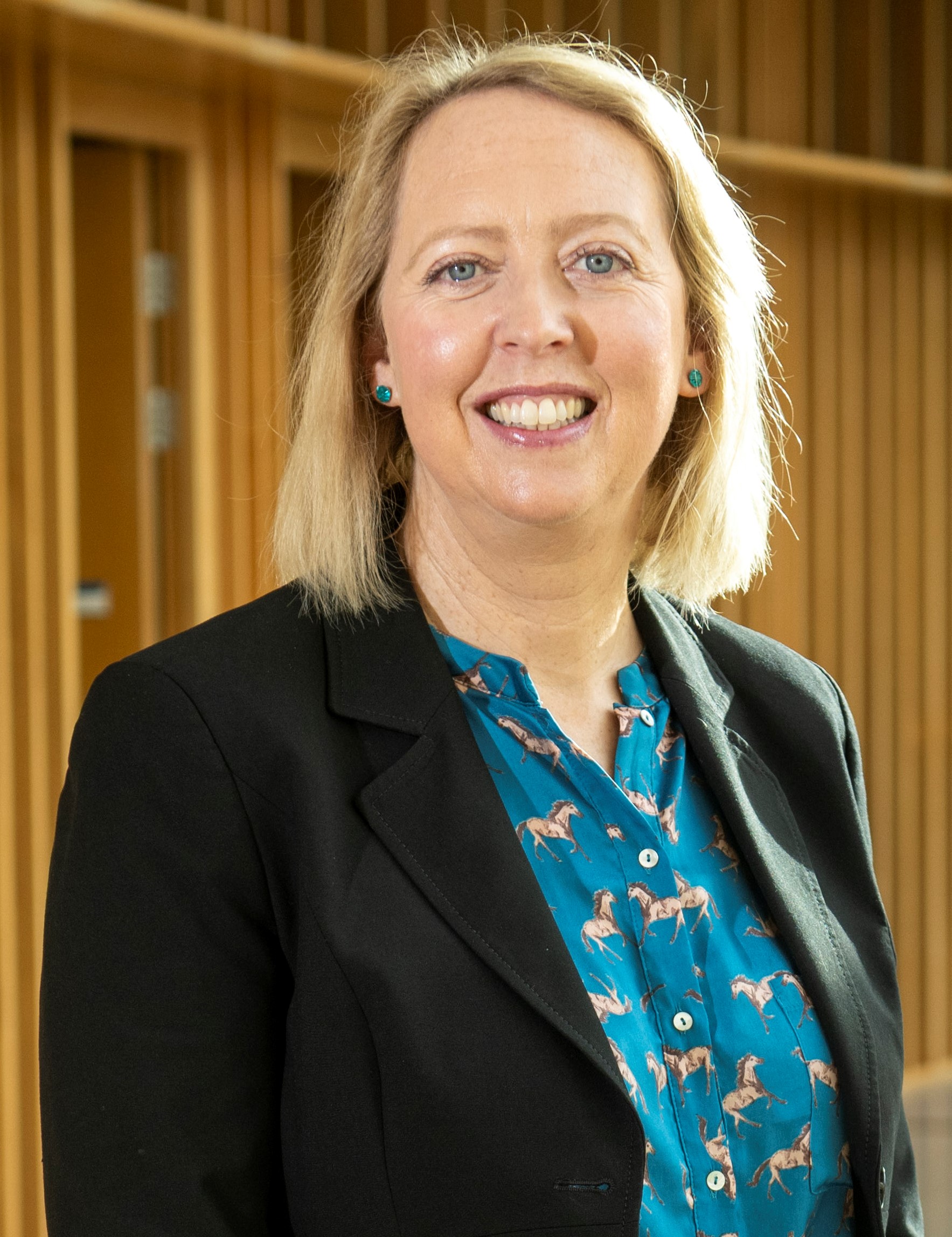
Dr. Fiona Grant has a background in marine geology and geophysics. Based in the Marine Institute, she has previously had responsibility for European Marine Research Infrastructures and now International Programmes. She is a National Contact Point and National Delegate for Horizon Europe Cluster 6 and the national expert for the Mission to Restore Our Ocean and Waters by 2030. The International Programmes manager acts as a key point of contact for Ireland in its relationships with international research organisations and Fiona's role is to support the development of a vibrant marine research community in Ireland by encouraging participation in European Union and other international research funding programmes. Fiona has been the Marine Institutes delegate to the European Marine Board for 12 years.
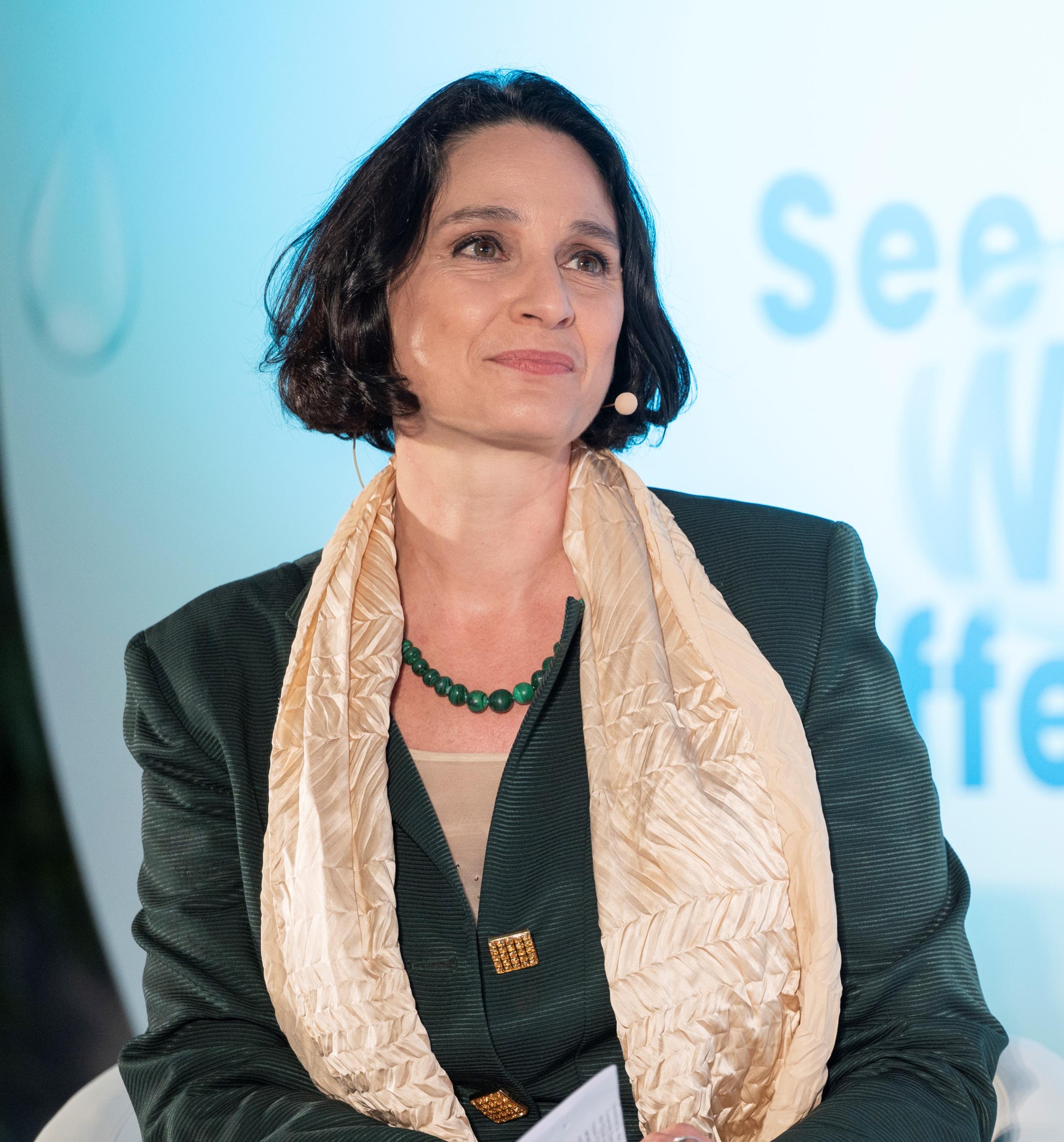
Ms. Veronica Manfredi is Director in DG Environment. Her Directorate plays a pivotal role in leading Europe towards Zero-Pollution and securing an effective management of Water – it thus significantly contributes to tackle the Climate, Biodiversity and Circular Economy challenges. Her Directorate is responsible for EU policies on Clean and Well-Managed Water (including the protection of all EU Freshwater and Marine environments, water Reuse, prevention from Floods, compliance with high health and environmental standards for Drinking Water and Urban Waste Water Treatment), and has oversight on EU laws and policies on Clean Air, Environmental Noise, Industrial Emissions, and prevention of Industrial Accidents. It also steers on the sound implementation of the Green City Accord which, in synergy with the Smart and Climate-Neutral Cities Mission, the Covenant of Mayors and other major urban initiatives, aims at tangibly delivering on the European Green Deal goals at local level. Internationally, her team leads the EU negotiations within the UN Minamata Convention on Mercury and the UN Convention on Long-Range Transboundary Air Pollution. It also provides steady support to the work of the four Regional Sea Conventions (notably the HELCOM – Baltic Sea, OSPAR – North Atlantic Sea, Barcelona – Mediterranean Sea, and the Bucharest Conventions – Black Sea) and the International Commissions for the Protection of the Rhine and Danube rivers. A lawyer by background, Veronica deepened her knowledge of International and EU law in Rome, Turin, Kiel, Bruges, and Brussels.

Mr. Andrea Vettori is Head of Unit Nature Conservation in the Directorate-General for the Environment of the European Commission, in charge of the implementation of the Birds and Habitats Directives and the Natura 2000 network of protected areas. Before that, he has been Deputy Head of the Land Use & Management Unit in the same DG, in charge of forest protection, soil protection, nitrates pollution prevention and the integration of the environment into agriculture. In the same DG he has been part of the team who prepared and conducted the negotiations on the 7th EU Environment Action Programme and worked on strategic planning and policy coordination, on resource efficiency, and on an environmental program for small and medium-sized enterprises. Before joining the European Commission, he worked in the European Parliament and for a European civil society organisation, as well as for the United Nations in New York. Italian national, he holds a degree in Business Administration and Economics from Bocconi University in Milan.
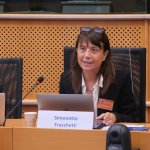 Prof. Simonetta Fraschetti is a Full Professor of Ecology at the Department of Biology, University Federico II, Naples, Italy where she teaches Fundamental Ecology and Marine Ecology. She is Chair of the European Marine Board Working Group on Marine Habitat Mapping, President of the Marine Biological Symposium, and Member of the Administration Council of the Stazione Zoologica Anton Dohrn. Her work combines descriptive research, manipulative experiments and spatial analysis techniques to gain a better understanding of the patterns of distribution of marine biodiversity and of the processes shaping marine communities, with the aim to improve the conservation, management and restoration of marine coastal systems. She has been invited to serve on advisory committees of international projects and as member of the International Committee Margalef Prize for the acknowledgement of excellent scientific careers in the field of ecology and environmental sciences.
Prof. Simonetta Fraschetti is a Full Professor of Ecology at the Department of Biology, University Federico II, Naples, Italy where she teaches Fundamental Ecology and Marine Ecology. She is Chair of the European Marine Board Working Group on Marine Habitat Mapping, President of the Marine Biological Symposium, and Member of the Administration Council of the Stazione Zoologica Anton Dohrn. Her work combines descriptive research, manipulative experiments and spatial analysis techniques to gain a better understanding of the patterns of distribution of marine biodiversity and of the processes shaping marine communities, with the aim to improve the conservation, management and restoration of marine coastal systems. She has been invited to serve on advisory committees of international projects and as member of the International Committee Margalef Prize for the acknowledgement of excellent scientific careers in the field of ecology and environmental sciences.
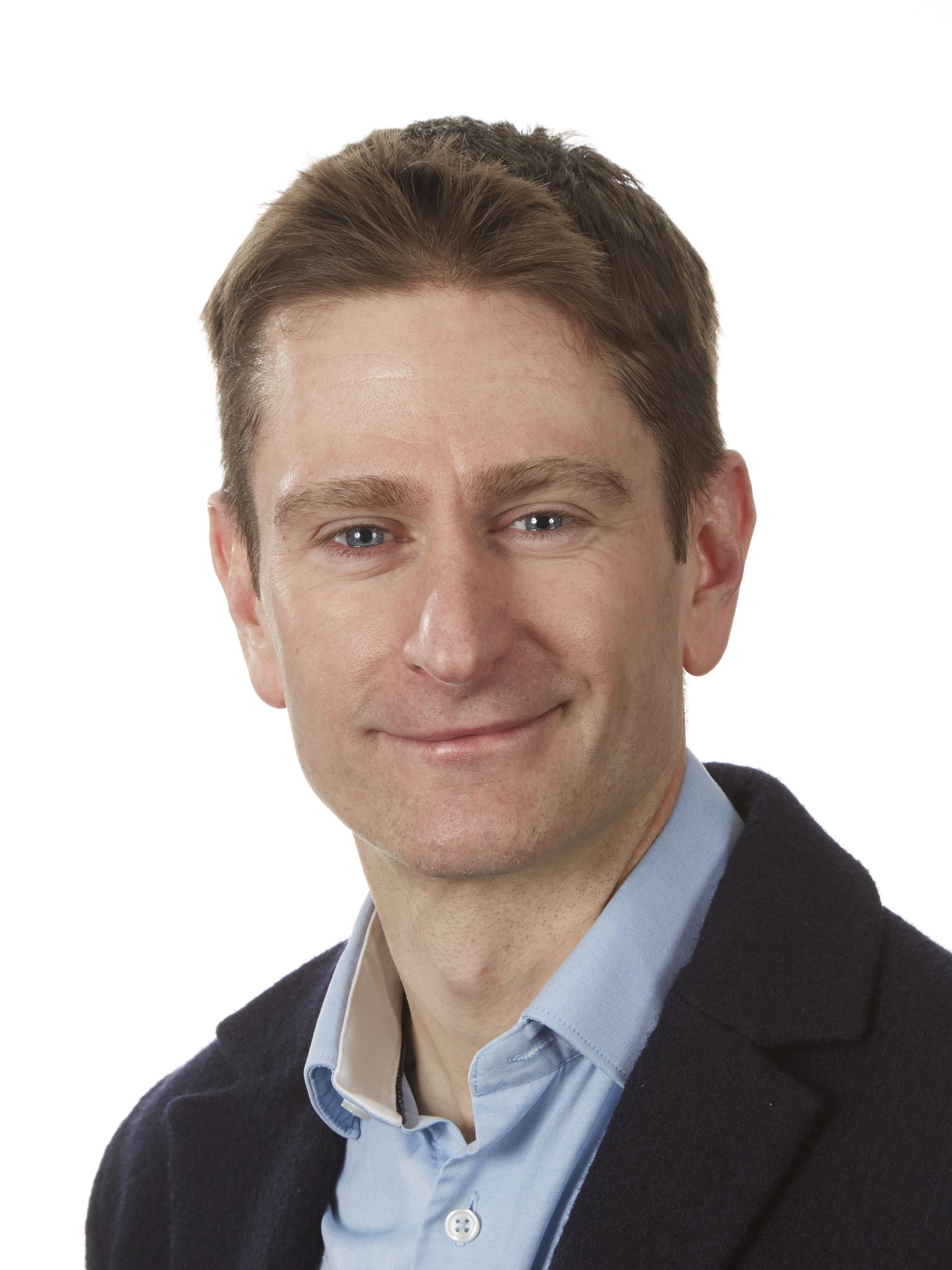 Dr. James Strong is a marine ecologist and the current leader of the Seafloor Ecosystems sub-group at NOC. His primary interests are the mapping and modelling of marine species and habitats. James current works on several habitat mapping related programmes such as the NERC-funded CLASS (Climate Linked Atlantic Sector Science) and ACCORD (Addressing Challenges of Coastal Communities through Ocean Research for Developing Economies) projects as well as H2020 projects such as iAtlantic. James also has mapping interests in shallow water and tropical settings as he is the mapping lead on CMEP (Commonwealth Marine Economies Programme) and the PI for the BVI Coastal mapping project. James also has previous experience in marine habitat restoration, blue carbon, the monitoring of coastal water quality, macroaglal ecology and marine management (e.g. marine spatial planning).He has just completed a six-year term (maximum term) as the chairperson for the ICES Working Group on Marine Habitat Mapping, for which, he received an ICES Service Award. He will continue to remain a member of the ICES working group and is currently the co-chair of the Working Group on Marine Habitat Mapping commissioned by the European Marine Board.
Dr. James Strong is a marine ecologist and the current leader of the Seafloor Ecosystems sub-group at NOC. His primary interests are the mapping and modelling of marine species and habitats. James current works on several habitat mapping related programmes such as the NERC-funded CLASS (Climate Linked Atlantic Sector Science) and ACCORD (Addressing Challenges of Coastal Communities through Ocean Research for Developing Economies) projects as well as H2020 projects such as iAtlantic. James also has mapping interests in shallow water and tropical settings as he is the mapping lead on CMEP (Commonwealth Marine Economies Programme) and the PI for the BVI Coastal mapping project. James also has previous experience in marine habitat restoration, blue carbon, the monitoring of coastal water quality, macroaglal ecology and marine management (e.g. marine spatial planning).He has just completed a six-year term (maximum term) as the chairperson for the ICES Working Group on Marine Habitat Mapping, for which, he received an ICES Service Award. He will continue to remain a member of the ICES working group and is currently the co-chair of the Working Group on Marine Habitat Mapping commissioned by the European Marine Board.